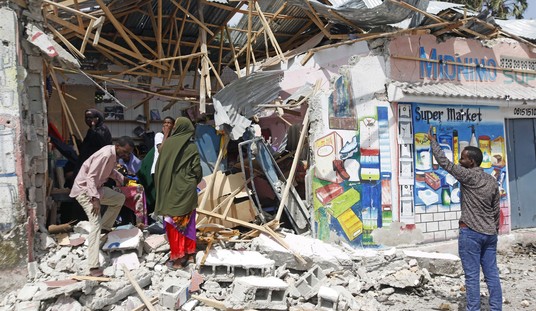The present conflict seems to me to be following the twentieth-century pattern exactly, with one variation: the antiliberal side right now, instead of Communist, Nazi, Catholic, or Fascist, happens to be radical Arab nationalist and Islamic fundamentalist. Over the last several decades, a variety of movements have arisen in the Arab and Islamic countries–a radical nationalism (Baath socialist, Marxist, pan-Arab, and so forth) and a series of Islamist movements (meaning Islamic fundamentalism in a political version). The movements have varied hugely and have even gone to war with one another–Iran’s Shiite Islamists versus Iraq’s Baath socialists, like Hitler and Stalin slugging it out. The Islamists give the impression of having wandered into modern life from the 13th century, and the Baathist and Marxist nationalisms have tried to seem modern and even futuristic.
But all of those movements have followed, each in its fashion, the twentieth-century pattern. They are antiliberal insurgencies. They have identified a people of the good, who are the Arabs or Muslims. They believe that their own societies have been infested with a hideous inner corruption, which must be rooted out. They observe that the inner infestation is supported by powerful external forces. And they gird their swords. Their thinking is apocalyptic. They imagine that at the end they, too, will succeed in establishing a blocklike, unchanging society, freed of the inner corruption–a purified society: the victory of good. They are the heirs of the twentieth-century totalitarians. Bush said that in his address to Congress on September 20, and he was right.
It is worth remarking how often an antipathy for the Jews has recurred in these various movements over the years. Nazi paranoia about the Jews was an extreme case, but it would be a mistake to suppose that Nazism was alone in this. At the end of his life, Stalin, the anti-Nazi, is thought to have been likewise planning a general massacre of the Jews, of which the “doctors’ plot” was a foretaste. The Nazi paranoia, just like Stalin’s, was owed strictly to ancient superstitions and especially to psychological fears–the fears that were sparked by the mere existence of a minority population that seemed incapable of blending into the seamless, blocklike perfect society of the future. The Arab radical and Islamist antipathy to the Jews naturally displays a somewhat different quality, given that, this time, the Jews do have a state of their own. And where there is power, conflicts are bound to be more than imaginary. No one can doubt that Palestinians do have grievances and that the grievances are infuriating. Israel has produced its share of thugs and even mass-murdering terrorists. It has even managed, at this of all moments, to choose as its leader Ariel Sharon, whose appreciation of Arab and Islamic sensibilities appears to be zero. In these ways, the Israelis have done their share to keep the pot boiling.
Even so, how can it be that, after 120 years of Arab-Zionist conflict and more than 50 years of a Jewish state, the hostility to Israel seems to have remained more or less constant? For Israel’s borders have been broad, but have also been narrow; its leaders have been hawkish and contemptuous, but have also been dovish and courteous; there have been West Bank settlements, and no West Bank settlements; proposals for common projects for mutual benefit, and no proposals. There have even been times, such as the 1980s, before the Russian immigration, when most of Israel’s Jewish population consisted of people who had fled to Israel from the Arab world itself, instead of from Europe. And not even then, in a period when Israel, in its dusky-skinned authenticity, could claim to be a genuinely third-world nation, did the Israelis win any wider or warmer acceptance. Why was that, and why is it still?
It is because the anti-Zionist hostility may rest partly on the hard terrain of negotiable grievances; but mostly it goes floating along on the same airy currents of myth and dread that proved so irresistible to Nazis in the past. The anti-Zionist hostility draws on a feeling that Arab and Islamic society has been polluted by an impure infestation that needs to be rooted out. The hostility draws, that is, on a lethal combination of utopian yearning and superstitious fear–the yearning for a new society cleansed of ethnic and religious difference, together with a fear of a diabolical minority population. Does that sound like an unfair or tendentious description of Middle Eastern anti-Zionism? The curses of the clerics, the earnest remarks of the presidents of Syria and Iraq and other countries, the man-in-the-street interviews that keep appearing in the press and on radio–these are not pretty to quote. Even now the newspapers in parts of the Islamic world are full of stories claiming that the World Trade Center was attacked by (of course) a Jewish conspiracy. And so, the Arab and Islamic world burns with hatred for Israel in part because of issues that are factual, but mostly because of issues that are phantasmagorical.
From Terror and Liberalism by Paul Berman.









Join the conversation as a VIP Member